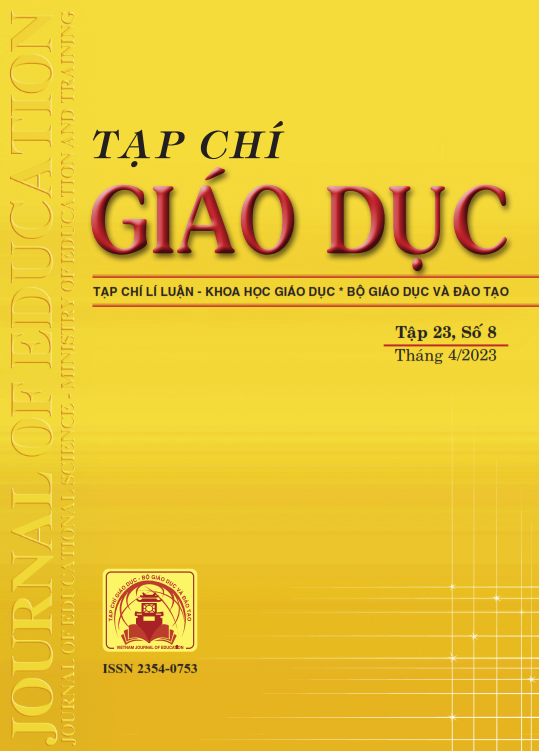Tác động của “rạp hát số” đối với giảng dạy tiếng Anh: nghiên cứu so sánh giữa nhận thức của giáo viên đã áp dụng và chưa áp dụng
Tóm tắt
Technology development has brought many changes to the methods and techniques of teaching and learning English in Vietnam. Online drama, or “Digital Theatre” is a new teaching technique that was formed and developed based on the traditional drama techniques in the classroom with the support of technology. The study was conducted to compare the perceptions of teachers who have and who have not applied the above technique to teaching and learning English in Vietnam. From the survey results, in many respects, the group of teachers who have applied “Digital Theatre” to teaching found that the impact of this technique was greater than what the “have not applied” group perceived. The research results highlight the potential of “Digital Theatre” in teaching English in Vietnam. Simultaneously, the current study also encourages teachers to apply this technique in their teaching because its impact on learners’ performance has been verified with authentic experience.
Tài liệu tham khảo
Baldwin, P., & Fleming, K. (2003). Teaching literacy through drama: Creative approaches. Routledge.
Barkema, H. G., Chen, X. P., George, G., Luo, Y., & Tsui, A. S. (2015). West meets East: New concepts and theories. Academy of Management Journal, 58(2), 460-479. https://doi.org/10.5465/amj.2015.4021
Burke, A. F., & O'Sullivan, J. (2002). Stage by stage: A handbook for using drama in the second language classroom. Portsmouth, NH: Heinemann.
Iamsaard, P., & Kerdpol, S. (2015). A Study of Effect of Dramatic Activities on Improving English Communicative Speaking Skill of Grade 11th Students. English Language Teaching, 8(11), 69-78. http://doi.org/10.5539/elt.v8n11p69
Maley, A., & Duff, A. (2005). Drama techniques: A resource book of communication activities for language teachers. Cambridge University Press.
Nguyen, H. T., Warren, W., & Fehring, H. (2014). Factors Affecting English Language Teaching and Learning in Higher Education. English Language Teaching, 7(8), 94-105. http://doi.org/10.5539/elt.v7n8p94
Pizolato, R. A., Rehder, M. I. B. C., dos Santos Dias, C. T., de Castro Meneghim, M., Ambrosano, G. M. B., Mialhe, F. L., & Pereira, A. C. (2013). Evaluation of the effectiveness of a voice training program for teachers. Journal of Voice, 27(5), 603-610. https://doi.org/10.1016/j.jvoice.2013.04.013
Pope, R. L., Reynolds, A. L., & Mueller, J. A. (2019). Multicultural competence in student affairs: Advancing social justice and inclusion. John Wiley & Sons.
Salas, E., Reyes, D. L., & McDaniel, S. H. (2018). The science of teamwork: Progress, reflections, and the road ahead. American Psychologist, 73(4), 593-600. https://doi.org/10.1037/amp0000334
Tajareh, M. J., Oroji, M. R., & Damavand, I. (2017). The impact of drama on Iranian EFL young learners’ reading comprehension performance. Bulletin de la Société Royale des Sciences de Liège, 86, 67-80. https://doi.org/10.25518/0037-9565.6577
Thu, T. N. M., Thi, T. D. V., Thuy, N. T., & Huy, D. T. N. (2021). Confucianism Theories and Its Influence on Vietnam Society. Elementary Education Online, 20(4), 1434-1434. https://doi.org/10.17051/ilkonline.2021.04.162
West, M. A., Tjosvold, D., & Smith, K. G. (Eds.). (2008). International handbook of organizational teamwork and cooperative working. John Wiley & Sons.
Tải xuống
Đã Xuất bản
Cách trích dẫn
Số
Chuyên mục
Giấy phép

Tác phẩm này được cấp phép theo Ghi nhận tác giả của Creative Commons Giấy phép quốc tế 4.0 .












